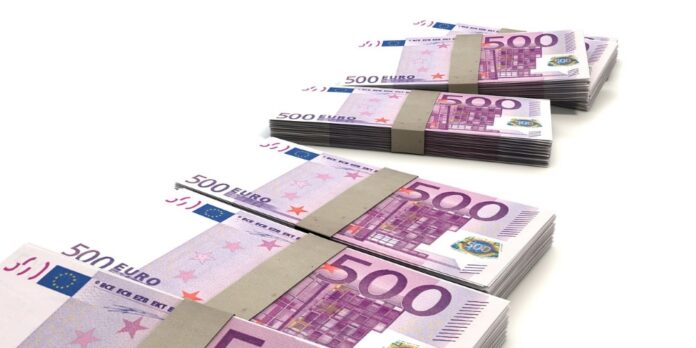
“Based on one summary analysis of the 2021-2022 comparison relating to the trend of final ascertained revenues, the main emphasis is on the increase in tax revenues (+55 billion), which stood at 578,7 billion in 2022, higher than the initial budget forecast (which indicated tax revenues of 565,2 billion). Among these stand out the higher revenue generated from taxes on wealth and income (+31,6 billion compared to 2021), from taxes and duties on business (+26,2 billion) and from proceeds from lotto, lotteries and other gaming activities (+€2,1 billion), against a lower revenue from taxes on production, consumption and customs (-4,9 billion)”.
That's what we read in dossier on the 2022 Report and 2023 Adjustment carried out by the Research Service and the Senate Budget Service and by the Research Service of the Budget Department of the Chamber.
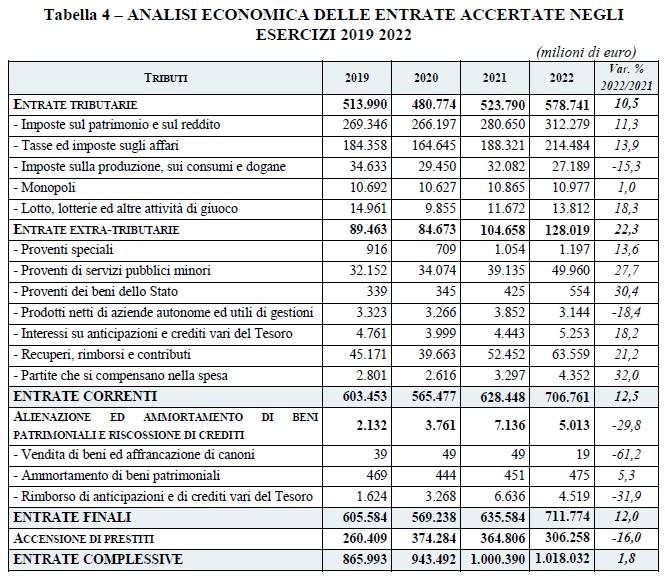
"Analysing the main taxes - continues the dossier -, among recurring income, the "IRES" represents the item that recorded the greatest positive change in percentage compared to the previous year (+40%), with assessments equal to 50,3, 35,9 billion, compared to 2021 billion in 2022, which, as highlighted in the 188,2 Tax Revenue Bulletin, released in March by the Finance Department of the MEF, is linked to the increase in the number of taxpayers and average payments. of tax revenues, the revenue from VAT contributed in particular, whose assessments amounted to 167 billion compared to 2021 billion in 14,8 (+2022% compared to the values of the previous year), increases due in particular to the levy component on domestic trade and imports (as already highlighted in the aforementioned 216 Tax Revenue Bulletin). There was also an increase in Irpef revenue, with assessments of approximately 5,6 billion (+2021% compared to the values for XNUMX). The the gaming sector is growing overall, with a 76% increase in the revenue from taxes levied on the games themselves".
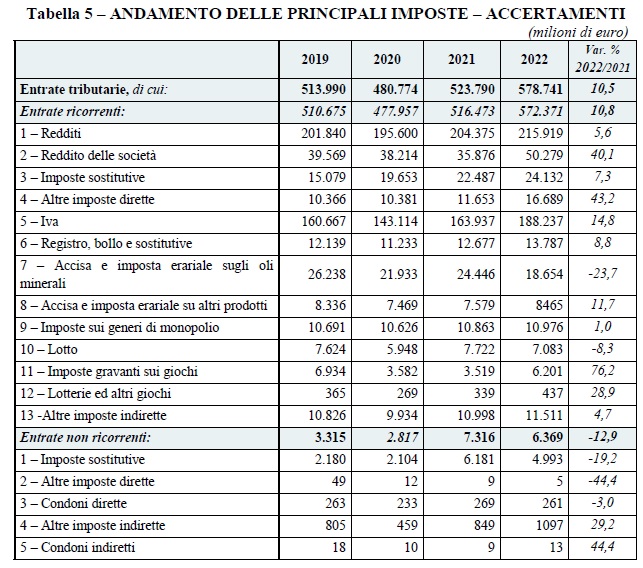
"In report to Parliament on the 2022 report – highlights the dossier again – the Court of Auditors has dedicated a specific part to dealing with the problems that have arisen in relation to the accounting procedures, both for revenue and for expenditure (in particular, in Volumes I (Income) and II (Expenses) of Volume III of the Report). (…) From the analyzes conducted in more detail on the underlying data, it emerged that the minor revenues pertaining to the initial forecasts are concentrated, within Title I, in eight chapters/articles:1203 art. 4 (VAT collected through registers), 1409 art.1 (excise duty on energy products, their derivatives and similar products collected on an ordinary basis), 1023 art.1 (IRPEF to be collected through registers), 1801 art.2 (income deriving from the game of lotto and other number games with fixed odds), 1033 art.1 (revenues in lieu of income taxes on the revaluation of company assets recorded in the balance sheet and on the divestment of funds in suspension of tax), 1026 art.18 (withholdings on the proceeds of units of collective investment undertakings in securities of foreign law) and 1024 articles 1 and 4 (IRES - payments due following the automatic and formal control of the returns and to be collected through rolls), for an amount of -25.447 million. (…) As regards, in particular, the proposals for changes to the revenues of the state budget, for final revenues, the adjustment bill contains a proposed reduction of 361 million, in terms of accruals, compared to the forecasts formulated with the 2023 budget law. In particular, tax revenues mainly incorporate the adjustment to the estimates of the DEF 2023, with a reduction of 784 million euros. Compared to the initial forecasts, the decrease is the result of a decrease in indirect taxes, for approximately 2,1 billion euro, partially offset by the expected increase for direct taxes of approximately 1,3 billion respectively. For the non-tax revenues the proposals indicate, overall, an increase of 423 million euros, due, in particular, to revenues from the betting and gaming sector, mainly lotteries (+718 million), the higher dividends to be paid by publicly held companies (+300 million) and the reimbursements obtained from the EU for the costs incurred for vaccines (+896 million)".
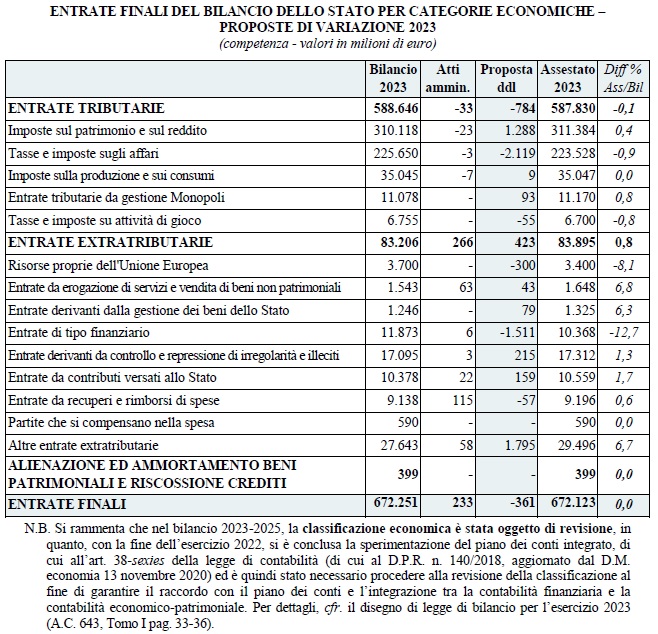
“Non-tax revenues – reads the dossier – increase overall by 423 million euros in terms of accruals, while the expected reduction in cash terms is only marginal (-15 million). Compared to the trend forecasts updated with the DEF and therefore with effects on net borrowing, for the forecasts that are settled, the following affect the expected increase:

On the other hand, they have a reduction in terms of indebtedness (therefore with a negative effect on the balance), for 300 million euros, of the revenues from traditional own resources collected on behalf of the European Union, which corresponds to an equivalent change in terms of expenditure. (…) As far as Expenses are concerned, the changes proposed with the adjustment bill amount to a decrease of 368 million euros in accrual terms and 2.709 million in cash terms. The increases in appropriations with an effect on debt (since they are additional to those established for alignment of the budget allocations with the trend forecasts of the DEF) concern:
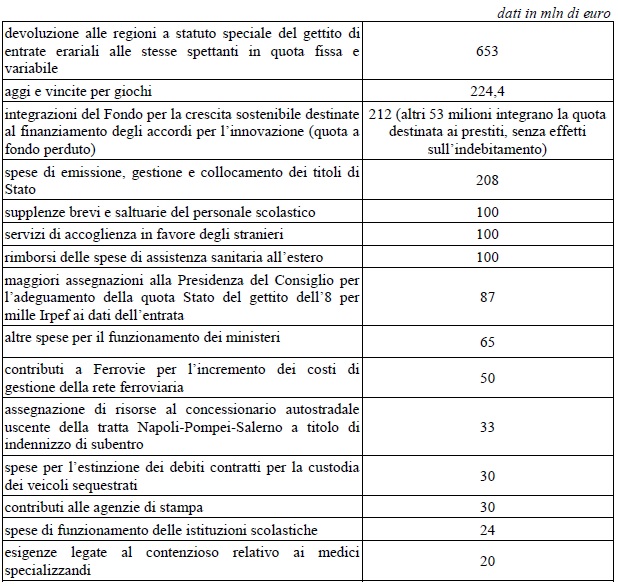
Among the reductions in appropriations with effects on debt (because they are additional to those ordered for alignment of the budget allocations with the trend forecasts of the DEF) include:

There are many changes in spending without an impact on net borrowing (since already considered in the public finance trends)”.










